|
|
|
Sort Order |
|
|
|
Items / Page
|
|
|
|
|
|
|
| Srl | Item |
| 1 |
ID:
154851
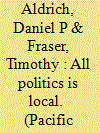

|
|
|
|
|
| Summary/Abstract |
Since the 3/11 compounded disasters, Japanese energy policy, especially its nuclear policy, has been paralyzed. After the Fukushima disasters, public opinion turned against nuclear energy while the central government continued to push for restarts of the many offline reactors. Based on nearly thirty interviews with relevant actors and primary and secondary materials, we use qualitative comparative analysis (QCA) and five case studies to illuminate the impact of conditions influencing reactor restarts in Japan after 3/11. We investigate which local actors hold the greatest power to veto nuclear power policy, and why and when they choose to use it. Key decisions in nuclear power policy involve approval from multiple institutions with varying legal jurisdiction, making vetoes the result of multiple actors and conditions. Certain legal and political factors, such as court, regulator, and gubernatorial opposition (or support), matter more than technical factors (such as the age of the reactor or its size) and other political factors (such as town council or prefectural assembly opposition or support). Local politics can stymie a national government’s nuclear policy goals through combinations of specific physical conditions and vetoes from relevant actors, rather than through the actions of local opposition or single “heroic” governors. Our findings challenge the assumption that utilities unilaterally accept a governor’s vetoes, but reinforce the notion that specific judicial and electoral veto players are blocking an otherwise expected return to a pro-nuclear status quo.
|
|
|
|
|
|
|
|
|
|
|
|
|
|
|
|
| 2 |
ID:
147309
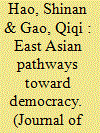

|
|
|
|
|
| Summary/Abstract |
What drove the East Asian tide of democratization during the “Third Wave?” Instead of focusing on a single-factor explanation, we perform qualitative comparative analysis (QCA) on fourteen cases in the region of East Asia from 1980 to 2000 and find three parallel pathways: (1) overthrow model, which features the positive effects of mass mobilization against authoritarianism under a deinstitutionalized authoritarian regime; (2) urban pressure model that works under an institutionalized authoritarian regime; and (3) inside-out model, in which democratization is triggered by the joint forces of domestic and international conditions under both types of regimes. These results demonstrate that the authoritarian status quo ante is an important determinant of democratic transitions.
|
|
|
|
|
|
|
|
|
|
|
|
|
|
|
|
| 3 |
ID:
143543
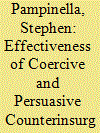

|
|
|
|
|
| Summary/Abstract |
Which counterinsurgency approaches are most effective in defeating insurgencies? Counterinsurgency advocates and critics have debated the effectiveness of winning hearts and minds as well as using brute force against ordinary civilians. But little scholarship has sought to systemically compare these counterinsurgency approaches among a broad range of cases. This paper seeks to remedy this gap in the literature with an empirical analysis of 47 counterinsurgency wars from 1945–2000 to evaluate the effectiveness of coercive and persuasive approaches to counterinsurgency. To do so, I use crisp-set qualitative comparative analysis (QCA), or Boolean analysis, to identify the presence or absence of six coercive and persuasive counterinsurgency practices across all cases. This method enables me to highlight how counterinsurgency victory can be produced by combinations of practices rather than a single set of practices that might be expected to be useful across cases. The results demonstrate that many combinations of coercive, persuasive, and mixed counterinsurgency practices can lead to victory. However, more persuasive combinations of practices consistently lead to counterinsurgent victory compared to others, although limited coercion against civilians is constant in all cases of counterinsurgency. These findings cast doubt on the ability of counterinsurgents to refrain from harming civilians and suggest that victory requires a mix of both positive and negative incentives for cooperation.
|
|
|
|
|
|
|
|
|
|
|
|
|
|
|
|
| 4 |
ID:
172158
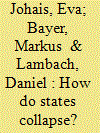

|
|
|
|
|
| Summary/Abstract |
State collapse is a highly consequential event. But we know very little about the reasons why and how states lose their capacities of violence control, rule-making and taxation. In order to explore the underlying causal mechanisms, we use a nested analysis combining Qualitative Comparative Analysis and comparative process-tracing. While the mobilisation of armed opposition groups is a necessary condition for state collapse, it only works in concurrence with other conditions, namely political transitions, repression, factionalism, intra-elite rivalry and external interventions. Thus, the article presents a causal model that shows the alternative pathways leading to state collapse.
|
|
|
|
|
|
|
|
|
|
|
|
|
|
|
|
| 5 |
ID:
186521
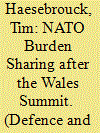

|
|
|
|
|
| Summary/Abstract |
At the 2014 Wales Summit, the NATO allies pledged to spend at least 2% of their GDP on defence by 2024. While some allies are on track to meet the 2% target, others only modestly augmented their military expenditures and still others have even reduced their defence budgets. This article aims to explain the diverging trajectories of the allies’ military expenditures during the first five years after the Wales Summit. More specifically, it introduces an integrated burden sharing model, which is tested with generalized set Qualitative Comparative Analysis. The results of the analysis indicate that the threat posed by Russia provided the most important incentive for increasing defence budgets. However, general budget constraints kept some allies from increasing their defence budget in proportion to the threat posed by Russia. Conversely, in the absence of budget constraints, allies governed by a right-leaning executive made intermediate budget efforts even if they only faced a low level of threat. Strikingly, budget inertia only had a modest impact on the allies’ defence budgets, only resulting in a low level of spending in allies that were not threatened by Russia and either faced considerable budget constraints or were governed by a left-wing government.
|
|
|
|
|
|
|
|
|
|
|
|
|
|
|
|
| 6 |
ID:
159746
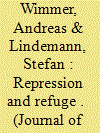

|
|
|
|
|
| Summary/Abstract |
This article asks why ethnic exclusion from executive-level state power leads to armed conflict in some cases but not in others. To resolve this puzzle, it focuses on the possible role of five additional, qualitatively coded factors that have been considered by either grievance or opportunity theories of civil war but for which quantitative data are not readily available. To assess the combined relevance of these factors, the authors use qualitative comparative analysis (QCA) to explore the diverging conflict trajectories of 58 ‘most similar’ ethnic groups. These groups have a uniformly high conflict propensity because they are politically excluded, situated in poor countries, live geographically concentrated, and comprise substantial parts of the population; yet, only 25 of them actually experienced violent conflict. The results show that the resentment created by ethno-political exclusion translates into violent conflict if the state reacts against initial protests and mobilization with indiscriminate violence, and if there is a refuge area either within or outside the country that allows regime opponents to organize armed resistance. Moreover, a more processual analysis of conflict dynamics reveals that the conditions conducive to ethnic rebellion appear in a particular temporal sequence with a clear and universal escalation pattern.
|
|
|
|
|
|
|
|
|
|
|
|
|
|
|
|
| 7 |
ID:
189268
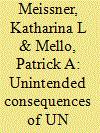

|
|
|
|
|
| Summary/Abstract |
Sanctions are widely used foreign policy tools in reaction to crises in world politics. Accordingly, literature on sanction effectiveness—their intended consequences—is abundant. Yet, fewer studies address the unintended consequences of restrictive measures. This is remarkable given that negative externalities are well documented. Our article explores this phenomenon by asking under which conditions sanctions yield negative externalities. We develop a theoretical conceptualization and explanatory framework for studying the unintended consequences of UN sanctions. Empirically, we draw on data from the rich, but scarcely used Targeted Sanctions Consortium and apply qualitative comparative analysis (QCA) to examine negative externalities of UN sanctions, complemented by illustrations from the cases Haiti and North Korea. The results document the existence of multiple pathways toward unintended consequences, highlighting the negative impact of comprehensive and long-lasting sanctions, as well as the ability of autocratic targets with economic means to persist unscathed from sanctions.
|
|
|
|
|
|
|
|
|
|
|
|
|
|
|
|
|
|
|
|
|